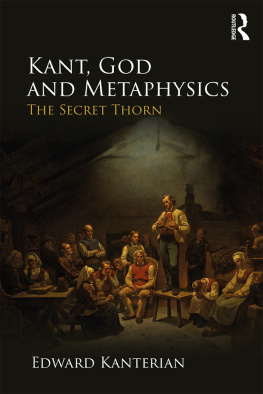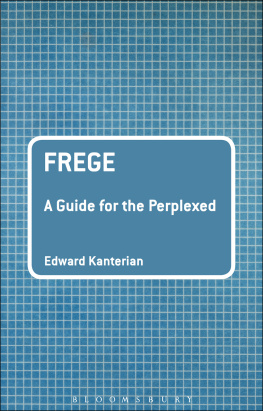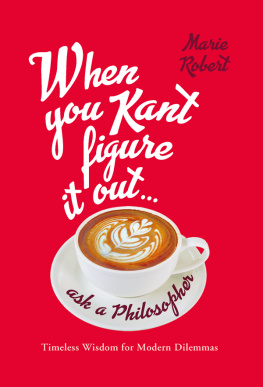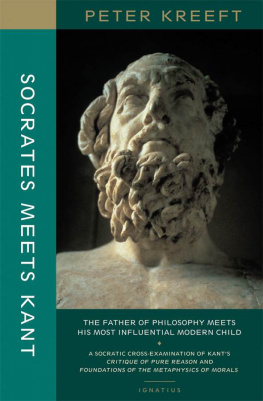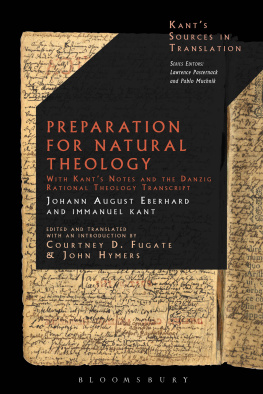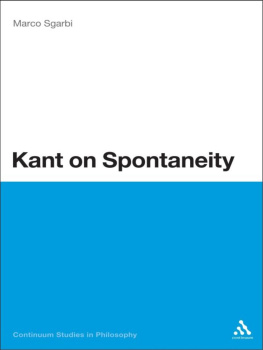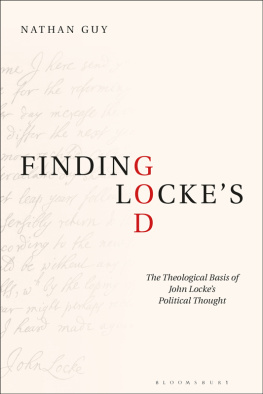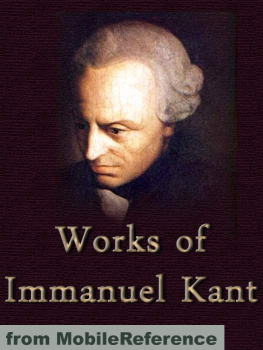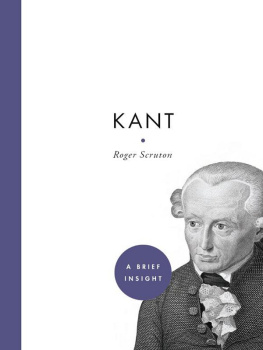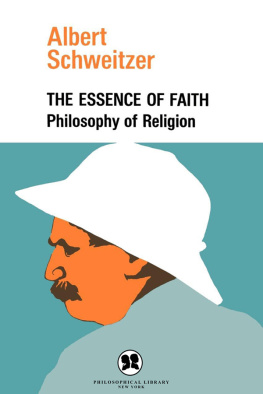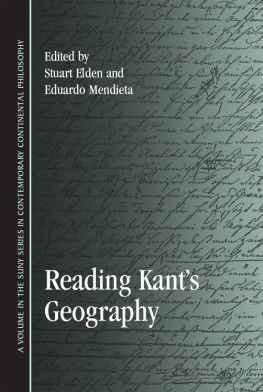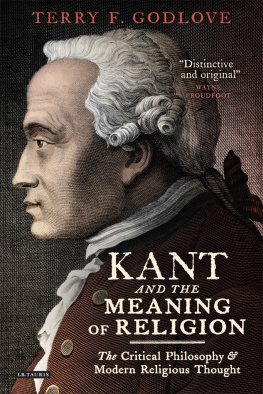
p.i
Kant, God and Metaphysics
Kant is widely acknowledged as the greatest philosopher of modern times. He undertook his famous critical turn to save human freedom and morality from the challenge of determinism and materialism. Intertwined with his metaphysical interests, however, he also had theological commitments, which have received insufficient attention. He believed that man is a fallen creature and in need of redemption. He intended to provide a fortress protecting religious faith from the failure of rationalist metaphysics, from the atheistic strands of the Enlightenment, from the new mathematical science of nature and from the dilemmas of Christian theology itself. Kant was an epistemologist, a philosopher of mind, a metaphysician of experience, an ethicist and a philosopher of religion. But all this was sustained by his religious faith.
This book aims to recover the focal point and inner contradictions of his thought, the secret thorn of his metaphysics (as Heidegger once put it). It first locates Kant in the tradition of reflection on the human weakness from Luther to Hume, and then engages in a critical, but charitable, manner with Kants entire pre-critical work, including his posthumous fragments. Special attention is given to The Only Possible Ground (1763), one of the most difficult, interesting and underestimated of Kants works. The book takes its cue from an older approach to Kant, but also engages with recent Anglophone and continental scholarship, and deploys modern analytical tools to make sense of Kant. What emerges is an innovative and thought-provoking interpretation of Kants metaphysics, set against the background of forgotten religious aspects of European philosophy.
Edward Kanterian is Senior Lecturer in philosophy at the University of Kent. Previously he was Lecturer in Philosophy at the University of Oxford. His research interests include metaphysics, the philosophy of logic and language, the ethics of memory, and modern philosophy. He is the author of several books, the most recent of which is on Freges logic.
p.iii
Kant, God and Metaphysics
The Secret Thorn
Edward Kanterian

p.iv
First published 2018
by Routledge
2 Park Square, Milton Park, Abingdon, Oxon OX14 4RN
and by Routledge
711 Third Avenue, New York, NY 10017
Routledge is an imprint of the Taylor & Francis Group, an informa business
2018 Edward Kanterian
The right of Edward Kanterian to be identified as author of this work has been asserted by him in accordance with sections 77 and 78 of the Copyright, Designs and Patents Act 1988.
All rights reserved. No part of this book may be reprinted or reproduced or utilised in any form or by any electronic, mechanical, or other means, now known or hereafter invented, including photocopying and recording, or in any information storage or retrieval system, without permission in writing from the publishers.
Trademark notice : Product or corporate names may be trademarks or registered trademarks, and are used only for identification and explanation without intent to infringe.
British Library Cataloguing-in-Publication Data
A catalogue record for this book is available from the British Library
Library of Congress Cataloging-in-Publication Data
A catalog record for this book has been requested
ISBN: 978-1-138-90858-1 (hbk)
ISBN: 978-0-203-72958-8 (ebk)
Typeset in Sabon
by Swales & Willis Ltd, Exeter, Devon, UK
p.v
For Hairig

p.xi
I would like to thank the following people for discussion, support and inspiration: Tom Alberto, Sorin Baiasu, Hanoch Ben-Yami, Tony Bruce, Florin Calian, Daniel Came, Gabrielle Coakeley, Eleanor Curran, Jonathan Egid, Fiona and Michael Ellis, James Fowler, Michael Franz, Steven Gerrard, Alain Gillain, Joshua Gottlieb, Peter Hacker, Steve Hall, Michael Inwood, Adam Johnson, Silvia Jonas, Csaba Lada, Lothar Kreimendahl, Matina Liosi, Adrian Moore, Colin Morgan, Julien Murzi, Thomas Oehl, Claude Selis, Rebecca Shillabeer, Jan Westerhoff, Allen Wood, and audiences at Canterbury, Durham, Hull, Keele and Oxford. I am also grateful for the resources I could use at the Bibliothque Royale de Belgique, the Bibliothque Saint Albert in Brussels, the University of Kent, the Staatsbibliothek Munich, the University of Oxford and at archive.org . I would also like to thank my family for their love and care, and especially Anna, Benny and his grandparents.
p.xii
It is no secret that transcendental idealism is the key doctrine of Kants mature philosophy, offering a fortification behind whose walls the concept of freedom, central to his practical philosophy, can be protected against any materialist or determinist attack. This idealism was also meant to put an end to any over-confident metaphysics that claimed to have, through a priori proofs, certain knowledge about the ultimate nature of the world, the immortality of the soul and the existence of God. Against such metaphysics Kant insisted on the cognitive limitations of man and on the illusory status of metaphysical claims.
Seen thus, transcendental idealism is an anti-metaphysical doctrine, with, at best, only an instrumental commitment to ultimate reality and the highest being, God. Of course, the term metaphysics has a positive use in Kants writings as well. In the Transcendental Doctrine of Method, after the destructive work of the critique of pure reason has been accomplished, Kant divides metaphysics into metaphysics of nature and metaphysics of morals. To each he later devotes a separate book. They are both disciplines describing those principles for the use of pure reason that still remain after the transcendental veil has cut us off from knowledge of things in themselves. Since the critique of pure reason is itself an exercise of pure reason, it makes sense to call this critique metaphysics too (cf. B869f.). Still, this positive understanding of metaphysics is entirely in line with Kants epistemological humility or ontological austerity.
Prevailing accounts of transcendental idealism, despite their disagreements, have taken this modesty as their departure point, treating Kant as the destroyer of traditional, transcendent, rationalist metaphysics, which he replaced with a metaphysics of experience (Paton, Bird), an account of our conceptual scheme (Strawson), a non-ontological analysis of the discursive nature of human cognition (Allison), a two-world ontology of ordinary objects and their representations (Guyer), an ontology of unknowable, bare substrata (Langton), a sophisticated form of phenomenalism (van Cleve), an adequate metaphysics for the sciences of his time (Friedman), an early version of analytic philosophy (Hanna), etc.
p.xiii
Kants critical philosophy may appear even more revolutionary, in fact. Since the final aim of the metaphysical systems of Descartes, Spinoza, Leibniz, Wolff was not merely to answer questions such as How is experience possible? or What are legitimate employments of pure reason?, it would be more accurate to describe the critical project not as placing metaphysics on a firm scientific foundation, as if it had existed before, but had lacked systematicity, but rather as redefining the nature of the discipline itself. And this would mean a major realignment of the entire discipline of philosophy away from metaphysics, But such domains were according to critical Kant domains of illusion and precisely not of knowledge. This is to conceive of the contrast between Kant and his predecessors in the starkest possible terms they did not even work in the same area as he did. They engaged in shallow chatter (4:256), while he conceived of his critical metaphysics as a perfectly new science, of which no one has ever even thought, the very idea of which was unknown (4:261f.), as he wrote in the Prolegomena .
Next page
